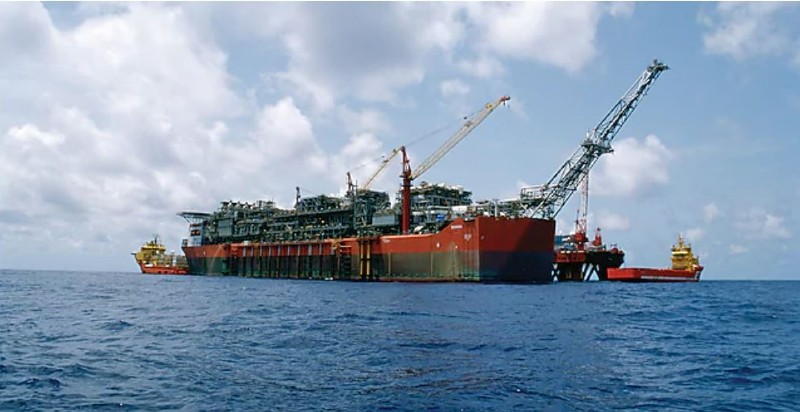By Adewole Kehinde
Bonga lays 120km south-west of the Niger Delta, in a water depth of over 1,000m.
The real extent of the Bonga field is approximately 60km². After acquiring and processing 3D seismic data in 1993-94, the first Bonga discovery well was drilled between September 1995 and January 1996.
Bonga is the first deep-water project for the Shell Nigeria Exploration and Production Company (SNEPCO) and for Nigeria.
Shell drilled an exploration well on Bonga Southwest located 10km south-west of the Bonga field in May 2001. Bonga Southwest was drilled in a water depth of 1,245m.
SNEPCO operates the field on behalf of the Nigerian National Petroleum Corporation (NNPC) and its partners under a production sharing contract. The partners in the field include Shell (55%), Esso (20%), Total (12.5%) and Agip (12.5%).
Crude oil production from the field started in November 2005 and the first shipment from the field was made in February 2006.
The field underwent its fourth Turnaround Maintenance (TAM) in 2017 and delivered 819 million barrels of oil by the end of 2018.

On the 25th May, 2021, the Nigerian National Petroleum Corporation signed a deal with its partners in the deep water oil block OML 118, as Africa’s largest oil producer takes step to improve its relations with International Oil Companies (IOC) in a bid to stop its recent output decline.
OML 118 contains Bonga, Nigeria’s first deep water oil field, which has the capacity to produce 225,000 b/d of crude oil and 150 MMcf/d of gas.
It will be recalled that NNPC renewed the OML license for the block’s partners Shell, Total, ExxonMobil and Eni for another 20 years and five agreements include settlements on a tax dispute, and production sharing contracts were finalized.
This is expected to pave the way for the much publicized and postponed expansion of the Bonga field, which until now has been shelved due to a long-standing tax dispute with Shell, the operator of the field.
At the heart of the Bonga expansion program is the development of the Bonga Southwest field, which had been put on hold for more than two years as Shell and the NNPC clashed over the commercial framework of the project.
During the renewal signing, NNPC’s Group Managing Director, Mallam Mele Kolo Kyari said over $10 billion of investment would be unlocked in the expansion program on the Bonga field as a result of the settlement of the disputes.
Kyari further said that it is an indication of a renewed confidence between NNPC and its partners; between the Federal Government and the investing communities.
There is no doubt that the OML license renewal will do a lot to improve the relationship between Nigeria and Shell, as the disputes had affected trust and investment.
It will be recalled that in 2019, Shell had gone ahead to invite bids from international contractors to build a new 150,000 b/d Floating Production Storage and Offloading (FPSO) platform for Bonga Southwest. The process was halted when Federal Government said it was reviewing the Production Sharing Contract agreement binding on the field.
This OML license renewal resolves the relations that have soured over recent years due to commercial and security issues, between Shell, Nigeria’s biggest oil Producer.
During the signing, the GMD, Mele Kyari said that the deal would yield over $780 million in immediate revenues to the Federal Government and would also free the parties from over $9billion in contingent liabilities.
Shell had previously said it would develop the Bonga Southwest project across three phases with a total potential yield of 3.2 billion barrels.
The Federal Government is banking on increased output from the field to raise its production capacity to close to 3million b/d in the coming years from current levels of 2.3million b/d.
This renewal is a good step to lure investors back to its oil and gas industry.
The upstream sector has not seen much action in the past five years due to continued regulatory uncertainty and high costs.
The introduction of transparency and accountability by Mallam Mele Kyari combined with implementing ongoing reforms in its oil sector essentially is already creating a more robust fiscal environment and making the country’s oil and gas sector more competitive.
In 2019, Federal Government increased taxes on its deep water oil production, which was not welcomed by many international oil companies. At the time, President Muhammadu Buhari had said FG would earn an additional $500 million from the review of the taxes in the PCS in 2020, rising to $1billion in 2021.
Nigerian crude oil and condensate production averaged as low as 1.65 million b/d for the first four months of this year, compared with 1.75 million b/d and 1.90 million b/d in 2020 and 2019, respectively, according to S&P Global Platts estimates.
There is no doubt these agreements will bring about growth in Nigeria where investment will come in for other assets, not just in the deep water, but even for new investors.
In conclusion, President Muhammadu Buhari and the NNPC Management Team must be commended for making it possible the NNPC to achieve this laudable landmark by settling the long standing commercial, tax disputes with partners even as the deal will give the Federal Government immediate income of $780million.
Adewole Kehinde is the Publisher of Swift Reporters and Energy Fellow of the Abuja Chamber of Commerce and Industry Policy Centre. He can be reached via 08166240846, 08123608662

